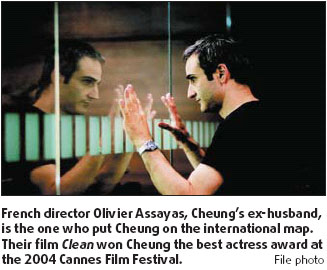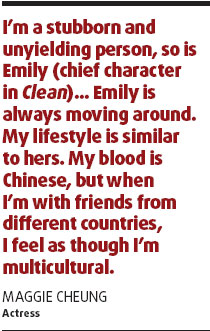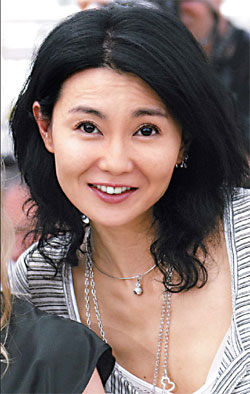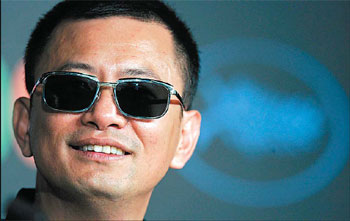Much ado about Maggie
Award-winning Australian cinematographer Christopher Doyle believes it is impossible to make Maggie Cheung look unattractive on the wide screen. The 43-year-old actress is a visual delight off-screen too.
Jury member Maggie Cheung poses during a photocall at the 60th Cannes Film Festival on May 16. |
Wearing a loose T-shirt and a pair of jeans, Cheung appeared in Cannes as a juror for the 60th International Film Festival, which has just concluded. On the red carpet, the star patiently signed autographs for feverish fans and took questions by reporters. It was a bit awkward: How would she judge director Wong Kar Wai's My Blueberry Nights?
Cheung seemed to dodge it, saying diplomatically: "While Wong's film was certainly good, there would be other good ones too." Asked by what criteria would she judge films she said: "There are simply good movies and bad movies for me. Analysis and calculation are the job of science and that is not for movies."
Indeed, it was not easy to answer, now that Cheung has parted ways with her long-time mentor. In Ashes of Time (1994), In the Mood for Love (2000) and 2046 (2004), her performances have been enchanting and spellbinding. Perhaps that is why Cheung names Wong as her cinematic mentor despite the fact their golden partnership officially ended when Cheung recently quit Wong's film company.
Cheung is best known in the West for her role in Zhang Yimou's martial arts action film Hero, Wong's In the Mood for Love, and Clean by her ex-husband, French director Olivier Assayas. In Asia, the former Miss Hong Kong runner-up may be better known for playing the girlfriend of a police detective opposite Jackie Chan, but she has won best actress awards for many films at festivals including Hong Kong, Hawaii, Cannes and Berlin.
However she always attributes her success to Wong, who let her realize her acting passion and help her craft a unique screen image.
"Wong changed my career. He talks to you. He gets into your state of mind, and then makes you understand the characters. He takes you seriously. With him, I became an actress, I moved away from the 'action-packed actress' label. I became conscious of my work," she says.
Cheung went to London at age 8 and was sent to a boarding school in Kent. At the time, there were only a few Chinese students in Britain and she didn't speak a word of English. "Prejudice was big," she recalls. "But when I came back to Hong Kong, I was the new kid in town because I just came back from England and suddenly was quite popular in that world."
Cheung started her career in modelling and didn't take her films seriously. For her, acting was a good excuse to avoid university and an easy way to make good money.
Director Wong Kar Wai is Maggie Cheung's cinematic mentor who has awoken her acting intuition. Reuters |
In As Tears Go By, Wong's first film, Cheung said the rookie director asked her to do something out of the ordinary. In an emotional scene in which Cheung was saying good-bye to Andy Lau at a bus stop, she was crying hard to show her sorrow. But Wong told her to take a different tact.
"It is not about how many tears drop or how emotional you are. Nobody cries like that. The minute you feel the sting in your eyes, your first reaction should be 'I don't want to cry,' and to hold it back."
It came as an inspiration. "There are layers of acting, I was just beginning to be in touch with it," she says. In their next cooperation, In the Mood for Love, Cheung wrote her part with Wong during shooting. She had just watched Ingmar Bergman's Touch and thought an "affair film" would be great. "We talked about it for three or four months before we started filming. Then, we'd sit around the set or trailer and we'd re-write the script on the spot."
This film could be the most successful cooperation between Cheung and Wong, in which Cheung's performance and appearance were sublime. The actress donned more than 20 gorgeous qipao dresses, which became a powerful visual tool in the film and one of the most popular features of this cult classic. Cheung won the best actress award at 2000 Golden Horse Film Festival and Hong Kong Academy Film Awards for her role.
However, when director Wong unveiled his long-anticipated film 2046, many viewers were disappointed because Cheung, the regular leading actress in Wong's films, was just in two vague scenes and her absence at the film's premier seemed to show the partners' separation.
"Repeating the same role is meaningless to me," explains Cheung, adding she still likes 2046 very much. "It's typical of Wong Kar Wai's films. If you're one of his fans, you'll find this film is great. And if you're not, you may like his work even less!"
Years later, when the two friends met at the Cannes Film Festival, they greeted each other as old friends.
If director Wong is the one who awoke Cheung's acting intuition, her ex-husband Assayas is the one who put Cheung on the international map. Their film Clean won Cheung the best actress award at the 2004 Cannes Film Festival.
The couple got together during the filming of Assayas' 1996 film Irma Vep (in which Cheung crawled on the rooftops of Paris dressed as an art thief) and signed the divorce papers in 2001 on Clean, which imbued the film with a heavy emotional tone for Cheung. "For years, my then husband was looking to write a part for me. He wrote Clean for me. It took five years for the project to mature. I was shooting 2046, but my heart was waiting for Clean," she said.
"I'm a stubborn and unyielding person, so is Emily (chief character in Clean). Of all the directors I've cooperated with, he's the only one who really understands me. I can be thoroughly relaxed when working with him."
Cheung says her life also mirrors the life of Emily. "Emily is always moving around. My lifestyle is similar to hers. My blood is Chinese, but when I'm with friends from different countries, I feel as though I'm multicultural. When I accept an invitation to do a film, I never think whether it will be shot in the United States, Europe or China."
Before 1994, she worked on up to 10 films a year. She has cut that to one film every two years. "People will remember my films more because it's not every month that you see a film with the same actor - it gets very boring."
With some 90 films during the past 25 years, Cheung says she is moving away from cinema. She has turned down 30 to 40 roles since she appeared as a drug-addicted aspiring singer in 2004's Clean. "I do read film scripts, but I just need something that is so 'wow'."
Now, Cheung spends half of her time in Hong Kong, a quarter of the time in Paris and the rest in London or on the road. As for Hollywood, she says "no" without hesitation.
"I know what would happen over there. If I take a Bond girl role, the Bond girl image will stick with me forever. People will only know you for that. That's unacceptable.
"I do not want more fame or more money. I am happy with what I have."
(China Daily 05/29/2007 page19)
















